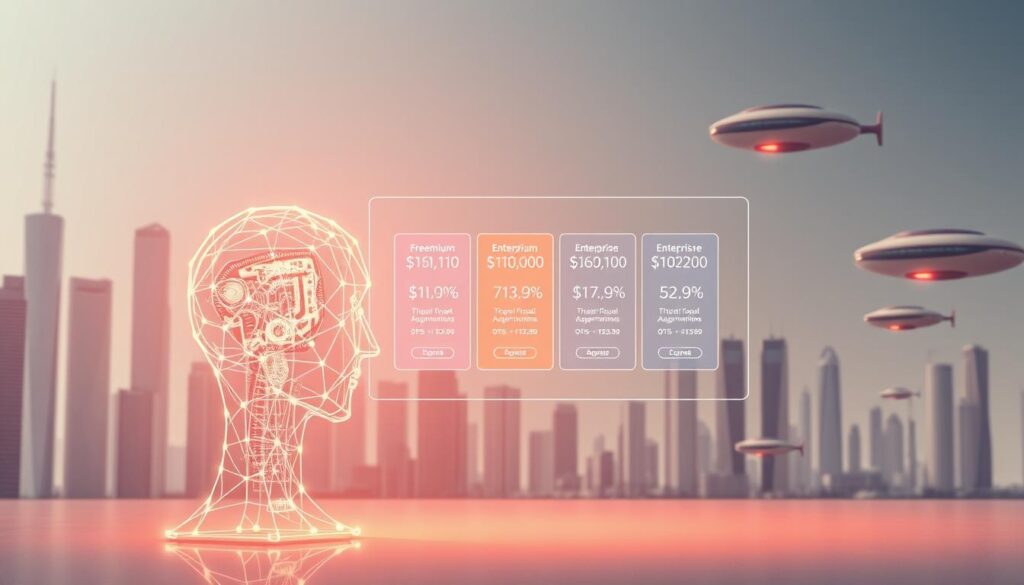Artificial intelligence is key in many fields today. It opens new ways to earn money online. The need for AI algorithms is growing fast, in areas like healthcare and finance.
The market for AI in marketing is set to hit $40 billion by 2025. This shows how fast and big the investment is. Companies using AI see a 30% jump in customer happiness. To learn more, visit AI and Data Monetization strategies.
AI is set to add $15.7 trillion to the global economy by 2030. It will change many industries, including marketing. Marketing agencies using AI could see a 40% boost in work efficiency.
This could lead to more money for them. Companies using AI for marketing see a 20% rise in customer interest. The need for AI experts is growing fast, with a 74% jump in job ads in four years.
Key Takeaways
- AI is expected to contribute significantly to the global economy by 2030.
- Marketing agencies can increase efficiency by up to 40% using AI tools.
- Businesses that implement AI-driven marketing strategies see a 20% increase in customer engagement.
- The demand for AI professionals is high, with a 74% increase in job postings over the past four years.
- AI-driven analytics tools can improve marketing ROI by up to 30% through data-driven decision-making.
- Companies that integrate AI into their marketing strategies report a 30% increase in customer satisfaction.
Understanding AI and Data Monetization
More companies see the worth in their data now. Machine learning helps them make money from this data. A Harvard Business Review survey found 91% of people think sharing data is key to success.
Using AI data monetization techniques is now very important. It lets companies make smart choices and grow. Alan D. Duncan from Gartner says data monetization is growing fast.
Key Considerations for Data Monetization
- Effective data parsing to make unstructured data usable
- Standardizing data products for scalability
- Strategic partnerships to enhance the value of datasets
Knowing about AI and data monetization helps companies make more money. They can stay ahead in the market. As more people want better data, those who use their data well will do great.
Identifying Market Needs
To do well in data monetization, knowing what the market needs is key. It’s about looking at trends and what customers want. A good data monetization platform helps businesses find new ways to make money and give customers what they want.
It’s important to think about data quality and following rules like GDPR and CCPA. Companies that use their data well can make more money. They do this by making things better inside and giving services that really help.
The world is getting more into data monetization. This is because of AI, big data, and cloud computing.
Here are some examples of doing well with data monetization:
- Starbucks’ 13% year-over-year growth in active rewards members due to data-driven targeted promotions
- Netflix’s 102% increase in new subscribers after implementing limitations on multi-household accounts
- Duolingo’s 4x increase in daily active users, thanks to targeting learners and keeping them interested
By knowing what the market wants and using AI, businesses can make more money. They can look for ways to sell data and use cloud services to manage it.
Building Effective AI Algorithms
To make good AI algorithms, knowing how to pick data and models is key. Using machine learning and AI data monetization techniques
In today’s world, making money from data is very important. Big companies like Amazon and Microsoft use machine learning to get better. They also use AI data monetization techniques to find new ways to make money.
Here are some important things to think about when making AI algorithms:
- Use good data to train and test models
- Pick the right machine learning models for the job
- Keep checking and improving how well the algorithm works
By following these tips and using optimizing data monetization strategies, businesses can make great AI algorithms. These algorithms help grow, work better, and make customers happier.
Data Sources for AI Algorithms
Data is key for making AI work well. As artificial intelligence needs grow, companies want to make money from their data. They look to use data monetization strategies to grow their business.
Publicly available datasets are a big help. They let companies build and test AI. But, to really make AI better, they need their own data. This data helps improve their AI solutions.
There are many public datasets out there. For example, there are images for computer vision and audio for speech recognition. These can be found on AI data marketplaces. Using these datasets and smart data monetization strategies helps companies grow in artificial intelligence.
Legal and Ethical Considerations
When using AI and Data Monetization, companies face many legal and ethical issues. They must follow rules like GDPR and CCPA to protect user data. They also need to make sure AI algorithms and data are not stolen.
A data monetization platform can help manage these issues. But, it’s key to pick one that values openness and being accountable. This way, companies can make money and act responsibly with AI and data.
Some important things for companies to think about include:
- Being clear about how they collect and use data
- Getting permission from people before using their personal info
- Using strong checks to stop fake information
- Checking AI tools often for fairness and ethics
By focusing on these points, companies can gain trust from their customers and others. As AI grows, it’s vital for businesses to keep up with new rules and ethics.
Pricing Your AI Algorithms
When pricing AI algorithms, many things matter. Machine learning and AI data monetization techniques help make money from data. But, it’s key to know how much value you give to customers.
Companies like Amazon and Uber use smart pricing. They change prices based on what’s happening now. This smart pricing can work for AI algorithms too.
To set the right price for an AI algorithm, think about a few things:
- How complex the algorithm is
- The value it gives to customers
- What the market wants and who else offers it
- The cost to make and keep it running
By looking at these points and using AI data monetization techniques
The secret to good pricing is finding a middle ground. With machine learning and optimizing data monetization, companies can set prices that help them grow. And they can do it while making sure customers get value.
Strategies for Selling AI Algorithms
Selling AI algorithms needs a good grasp of the market and what customers want. By using data monetization strategies, companies can make money from their AI. Artificial intelligence helps in creating and using AI algorithms that customers need.
There are two main ways to sell AI algorithms: direct sales and partnerships. Direct sales mean selling AI algorithms straight to customers. Partnerships mean working with other companies to sell AI algorithms. Online marketplaces for AI solutions also help sell AI algorithms. They let businesses show off their AI skills and find customers.
- Direct sales let businesses control the sales process and build strong customer relationships.
- Partnerships help businesses use other companies’ expertise and resources, growing their reach and abilities.
- Online marketplaces make it easy for businesses to sell AI algorithms, reaching more people and making sales smoother.
Knowing the good points of each way helps businesses sell AI algorithms well. This means understanding the market, what customers need, and how artificial intelligence helps businesses succeed.
Marketing AI Algorithms
Marketing AI algorithms are key to a business’s success. A strong brand and digital marketing help reach more people. Leveraging AI for monetization uses data platforms.
AI in marketing analyzes lots of data for insights. This helps companies understand their customers better. For example, Salesforce and Adobe use AI in their marketing.
Ways to market AI algorithms include:
* Using SEO to be seen more
* Making engaging content to draw in customers
* Social media marketing to reach more people
* AI-powered hyper-personalization to improve customer interaction
These strategies help companies market their AI and make more money. AI and data monetization will keep growing. Companies like Alibaba are becoming data-focused and use machine learning for decisions.
Case Studies of Successful AI Monetization
Companies like Wayfair and Mass General Brigham use AI in cool ways. They use it for making images, talking to patients, and predicting sales. For example, generative AI helps make products that fit what customers want. This makes customers happy and helps sell more.
Top companies make 11% of their money from using AI. But, the bottom ones only make 2%. This shows how big a deal optimizing data monetization is. Using machine learning and AI data monetization techniques can open up new ways to make money.
Some big wins from using AI include:
- Being able to predict how much money you’ll make
- Making customers happier
- Working more efficiently
By using AI data monetization techniques and machine learning, companies can grow. As AI gets more popular, those who focus on optimizing data monetization will do well.
Future Trends in AI and Data Monetization
Data monetization strategies will be key for business success in the future. Artificial intelligence will help unlock new revenue streams. This will give companies a competitive edge.
Monetizing data assets will become more important. Companies will create new products and services using data. They will also find new ways to make money through data partnerships.
AI could add a lot of value to businesses. Morgan Stanley Research says it could add 30 basis points to 2025 net margins for S&P 500 members. Companies that use AI have seen better earnings in the fourth quarter. This shows AI and data analytics will lead to new ways to make money.
FAQ
What is the process of creating and selling AI algorithms, and how can it be a lucrative business?
What is data monetization, and how does AI play a role in this process?
How can I identify market needs for AI algorithms, and what are some profitable niches to consider?
What are the key factors in building effective AI algorithms, and how can I utilize open source tools to build and test them?
What are some sources of data for building AI algorithms, and how can I collect proprietary data?
What are some legal and ethical considerations I should be aware of when creating and selling AI algorithms?
How can I price my AI algorithms, and what are some competitive pricing strategies to consider?
What are some strategies for selling AI algorithms, and how can I develop a sales strategy that works for my business?
How can I market my AI algorithms, and what are some digital marketing techniques to consider?
What can I learn from case studies of successful AI monetization, and how can I apply these lessons to my own business?
What are some future trends in AI and data monetization, and how can I prepare my business for these changes?
Source Links
- How to Make Money with AI: 20 Ways to Monetize Innovation – https://www.vendasta.com/how-to-make-money-ai/
- Data Monetization: The Role of AI and Machine Learning in Creating New Revenue – https://www.knowledge-sourcing.com/resources/thought-articles/data-monetization-the-role-of-ai-and-machine-learning-in-creating-new-revenue/
- Unlocking the Wealth of AI: How to Monetize AI and AI-Powered Apps
– https://www.linkedin.com/pulse/unlocking-wealth-ai-how-monetize-ai-powered-apps-mwaniki-kanyi-2sbwc
- The Growing Importance of Data Monetization in the Age of AI – https://aithority.com/machine-learning/the-growing-importance-of-data-monetization-in-the-age-of-ai/
- Monetizing Data With AI: MIT CISR’s Barb Wixom – https://sloanreview.mit.edu/audio/monetizing-data-with-ai-mit-cisrs-barb-wixom/
- 3 Metrics Businesses Must Use To Measure AI And Data Monetization ROI – https://www.forbes.com/councils/forbestechcouncil/2024/10/30/3-key-metrics-businesses-must-use-to-measure-ai-and-data-monetization-roi/
- Data Monetization Decoded: Turn Information Into Profit | Sigma – https://www.sigmacomputing.com/blog/data-monetization
- Data Monetization Trends: Insights From 1000 Organizations – https://www.forbes.com/sites/douglaslaney/2024/09/26/data-monetization-trends-insights-from-1000-organizations/
- AI-Driven Business Models: 4 Characteristics | HBS Online – https://online.hbs.edu/blog/post/ai-driven-business-models
- How to Use AI to Make Money: 25 Examples – https://www.castmagic.io/post/how-to-use-ai-to-make-money-25-examples
- The AI Data Factory – DDN – https://www.ddn.com/resources/whitepapers/the-ai-data-factory/
- AI Data Marketplaces | What is an AI Data Marketplace? | Monda – https://www.monda.ai/blog/ai-data-marketplaces
- Navigating the Ethical, Legal and Security Aspects of AI Editorial Tools in Media | Ring Publishing – News and Solutions – https://ringpublishing.com/blog/ai-tools-and-insights/the-ethical-and-legal-challenges-of-ai-in-media/4g2vh4b
- Guide To Ethical Considerations of AI in Marketing – https://medium.com/@byanalytixlabs/guide-to-ethical-considerations-of-ai-in-marketing-de55c5aede40
- Four Proven Data Monetization Strategies In The Age Of AI – https://www.forbes.com/councils/forbestechcouncil/2024/08/08/four-proven-data-monetization-strategies-in-the-age-of-ai/
- AI Pricing and Monetization Glossary I Ibbaka – https://www.ibbaka.com/ai-pricing-and-monetization-glossary
- PRICING STRATEGIES AND AI: Legal Guidelines for Businesses – https://www.linkedin.com/pulse/pricing-strategies-ai-legal-guidelines-businesses-agwu-okoro-d9bif
- Best Practices for Monetizing AI Successfully – https://www.moesif.com/blog/monitoring/Best-Practices-for-Monetizing-AI-Successfully/
- Industry Insights: AI’s impact on personalization, monetization and advertising – https://www.newscaststudio.com/2025/02/13/industry-insights-ais-impact-on-personalization-monetization-and-advertising/
- The future of marketing: AI transformations by 2025 – https://www.contentgrip.com/future-ai-marketing/
- The AI marketing revolution – https://www.dukece.com/insights/the-ai-marketing-revolution/
- Unlocking the Power of Data Monetization and AI-Driven Business Transformation – CXO Outlook – https://www.cxooutlook.com/unlocking-the-power-of-data-monetization-and-ai-driven-business-transformation/
- AI Monetization: Driving Value with Usage Data – https://www.linkedin.com/pulse/ai-monetization-driving-value-usage-data-digital-route-it2wf
- AI monetization: A new revenue growth agenda for CSPs – https://www.ciena.com/insights/blog/2024/artificial-intelligence-monetization-a-new-revenue-growth-agenda-for-communication-service-providers
- Reaping the Rewards of AI Investments | Morgan Stanley – https://www.morganstanley.com/insights/articles/ai-monetization-race-to-roi-tmt
- The Future of Data Monetization: Insights from Edgematics Group – Edgematics – https://edgematics.ai/the-future-of-data-monetization-insights-from-edgematics-group/
- How to Monetize AI: Key Steps for 2025 and Beyond – https://www.revenera.com/blog/software-monetization/how-to-monetize-ai/








